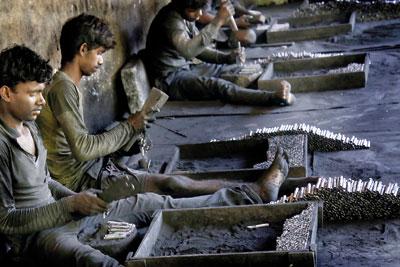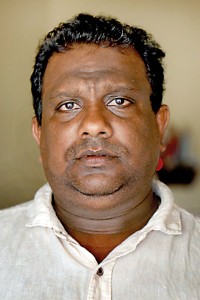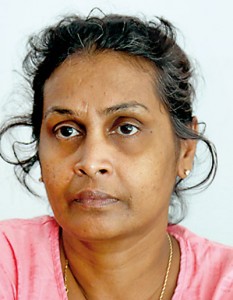News
Bang goes the future of small-time cracker makers
Traditional small-time firecracker manufacturers, who have exploded in numbers and mostly work in small, highly dangerous premises, face being snuffed out by tightened licencing procedures that favour the bigger manufacturers.

Dangerous work:No face-masks or attire to protect them from aluminum powder, potassium nitrate etc. Pix by M.A. Pushpa Kumara
The government has restricted the issuing of chemical components needed to manufacture firecrackers to only 176 makers who have licences for the trade while thousands of makers are unlicensed.
On a visit to Kimbulapitiya, centre of the cracker industry, The Sunday Times observed manufacturers big and small preparing for one of the biggest sales periods of the year – the Sinhala and Tamil New Year celebrations.
Denied licences because they cannot meet the required space, equipment and other criteria needed for certification as legal manufacturers, the illegal makers, working mostly out of their homes, were busy at work despite the threat of police and legal action. Generations have grown up in these family businesses.
Many of the small-scale producers had their shops shut down this year by police for operating illegally but they are back at work secretly despite fear of arrest.
Investigation by this paper found that neither licensed nor unlicensed cracker makers use safety workwear and equipment to protect themselves and their employees from the chemicals used to make fireworks.
The bodies of the men and women making fireworks were covered in a silvery layer of aluminum powder. They had no face-masks or attire to protect them from inhaling aluminum powder, potassium nitrate and the other chemicals used.
Even licensed makers had poor provision of safety gear for their employees.
The unlicensed makers say they try to purchase chemicals from mass-scale licensed cracker producers who sell chemicals on the black market, or they use relatives’ licences to get the materials.
One small-scale fireworks maker in Kimbulapitiya, S.B.N.A. Perera, who has been in the business for 23 years, said he had been arrested more than 50 times and produced in court twice for operating without a licence.
“Before me, my mother ran the business. It’s not only I who engage in the business – the whole village of around 15,000 families, depend on this occupation. It was passed down through generations but now we are considered criminals and taken to the police station,” he said.

Dinesh Fernando
He said that when small-scale cracker makers go to the authorities to obtain a licence they are presented with a long list of criteria that are impossible to meet.
Mr. Perera said this year, because of the licence restrictions, they were unable to purchase all the chemicals they needed.
Katana police confirmed they were taking action against people who make crackers illegally.
All-Island Fireworks Manufacturers Association President Dinesh Fernando said the problems in the industry had occurred due to poor regulation by the authorities.
He said although the entire village of Kimbulapitiya specialises in fireworks manufacture only about 170 people had licences to buy the components needed for their products.
Mr, Fernando said that initially there were only about 400 traditional fireworks producers, but afterwards the number had increased to about 4,000 as their children and villagers from other areas who worked in fireworks factories bought land and started their own businesses.
Numbers increased further when the large-scale producers started selling their excess chemicals to the small manufacturers.
“This started with them giving raw material to their employees to make components of firecrackers at home. Now it has turned into another business,” Mr. Fernando said. “The authorities have now reduced the quantity of chemicals given to every licensed cracker producer, creating difficulties for everyone.”
He said the government should take action against such producers as well as taking action against unlicensed makers.
A medium-scale fireworks producer, Lasitha Fernando, said the shortage of chemicals used for fireworks had forced makers to increase prices.
She said a cracker with a wholesale price of Rs. 3 this year – and which will retail for about Rs. 8 – was sold last year for Rs. 1.50.
“There is a shortage of material. We only had half the explosive material we obtained last year,” Ms. Fernando said.
Because the reduced supply means the fireworks producers are making fewer crackers and raising their prices, she says imported crackers are invading the local markets and affecting business.
She said the government, specifically the Defence Ministry, which regulates the use of explosives, provided poor support and was unable to deliver on time the 150kg of potassium nitrate she required.

Lasitha Fernando
“The government claims there is a shortage of chemicals, saying the Israeli company that provides chemicals has closed and that the State Trading Corporation is importing shipments from Chile,” Ms. Fernando said.
Even with the imports from Chile there was still a shortage, she said. She added that a few large-scale fireworks producers were selling at high prices, stocks from Israel that had been held in storage for a long time.
Ms. Fernando said a shipment of low-quality explosive products had come in from Thailand and that these substances were reacting with the aluminum dust packed in the fireworks, causing them to heat up.
An official of the State Trading Corporation said potassium nitrate was in short supply because the government was providing it, via five dealers, for distribution only to licensed fireworks makers.
He admitted that the shortage was also due to the closure of Israel-based Haifa Chemicals Ltd, which specialised in fertiliser chemicals and industrial chemicals.
He said when the government was informed a few years ago that the plant would be closed it tried to buy chemicals from other countries but these attempts were blocked by protests by people in the local fireworks industry.
“Recently, when the Israeli plant was closed, we brought a shipment of six containers of potassium nitrate from a company based in Thailand,” he said. He admitted that the government did not test the products adequately.
One container contained chemicals of low quality and a recall notice was issued for this load. Part of it had, however, already gone into fireworks.
He confirmed that some of the main dealers sold material to unlicensed cracker producers.
A senior official of the Defence Ministry said the ministry tried to regulate the fireworks industry because explosive material was used in the products. He said that small-scale manufacturers had been urged to take out licences but were unwilling to do so.
He claimed that explosive chemicals were tested before being made available to cracker producers.
Assistant Explosives Regulator of Gampaha District, D.W.N.P. Pathirana said too many operators had entered the fireworks production industry and that they were not taking safety measures.
He said a fireworks manufacturing plant should be on at least 40 perches of land and have separate storage areas.
“We are responsible for public safety and the safety of the producers who work with explosives and therefore we requested police assistance to stop illegal cracker producers,” he said.
Mr. Pathirana said that although many people regarded government licensing as interference in a traditional occupation they had to comply with the law.

